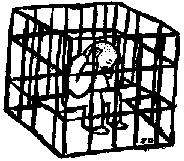|
HUMAN RIGHTS WATCH PRISON PROJECT
EXCESSIVE PRETRIAL DETENTION In numerous countries -- including Bangladesh, Chad, the Dominican Republic, Ecuador, El Salvador, Guatemala, Haiti, Honduras, India, Mali, Nigeria, Pakistan, Paraguay, Peru, Rwanda, Uganda, Uruguay and Venezuela -- unsentenced prisoners make up the majority of the prison population. Such detainees may in many instances be held for years before being judged not guilty of the crime with which they were charged. They may even be imprisoned for periods longer than the sentences they would have served had they been found guilty. This state of affairs not only violates fundamental human rights norms, it contributes significantly to prison overcrowding, a problem that is itself at the root of numerous additional abuses. The lengthy detention of unsentenced prisoners has its origins in two common phenomena: the denial of pretrial release to criminal defendants, and the excessive duration of criminal proceedings. Both of these ingredients in themselves violate international human rights norms, but combined together they constitute a grievious affront to justice.
The laws of many countries, either as they are written or as they are applied, do not satisfy these criteria. Some countries simply lack a mechanism for granting pretrial release. In other countries, large categories of prisoners -- such as persons charged with drug crimes or crimes of violence, or recidivists -- may be disqualified from obtaining relief under the terms of provisional liberty laws. In such countries, accordingly, the large majority of pretrial detainees may not be eligible for provisional release. Moreover, judges are often hostile to the idea of pretrial release, leading them to refuse to apply provisional liberty laws even to eligible defendants. Particularly when defendants are detained, the long delays associated with criminal trials in many countries are also inconsistent with international human rights norms. Such delays violate two provisions of the ICCPR, Articles 9(3) and 14(3)(c), which prohibit unreasonably protracted criminal proceedings. Although the U.N. Human Rights Committee has emphasized that long criminal proceedings must be assessed on a case-by-case basis, in the absence of unusual circumstances it has found that trial proceedings of more than a few years constitute a violation of these rights. Notably, in making such determinations, the committee has stressed that "[t]he lack of adequate budgetary appropriations for the administration of criminal justice . . . does not justify unreasonable delays in the adjudication of criminal cases." There is no dearth of authoritative pronouncements that unduly prolonged pretrial detention is a human rights violation. Instead, what is lacking is government attention to the issue, broad-based study of possible reforms, and international assistance in implementing them. Solving the problem of excessive pretrial detention will require innovative thinking. In some countries, the needed reforms may include amending or overhauling the code of criminal procedure; strengthening the judiciary and, in particular, increasing its size and efficiency; adopting provisional release laws; and establishing a bail system or other effective substitute for detention. The precise nature of these reforms will require careful examination and analysis in order for them to fit comfortably within a country’s existing legal framework. (Illustration by John Overmyer.)
|
